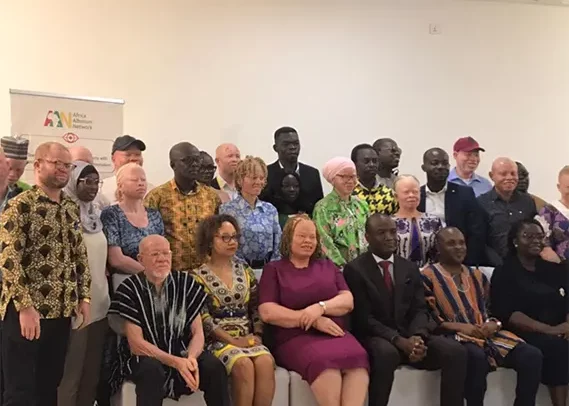Members of the Albinism community and guests in a group photograph at the launch
THE HUMAN Rights Situational Analysis Report of Persons with Albinism in Ghana has revealed that women with albinism often face challenges while accessing sexual and reproductive health services, as many healthcare professionals, especially nurses and midwives in rural areas, generally believe the myths and misconceptions about albinism.
These professionals, according to the report, are often overly aggressive during the process of seeking reproductive healthcare.
It further stated that women with albinism get ridiculed by nurses and midwives while in labour, often suggesting that they should be asexual or refrain from having children because of their condition.
“I faced challenges on my visit to the clinic while pregnant because a nurse made a comment when the doctor asked me to do a stool test, and the nurse was wondering if I would be able to bring a stool for testing or if I would go and collect someone else’s stool because she had learned that persons with albinism could not pass stool on Fridays,” one interlocutor shared in the report.
The report also indicated that persons with albinism face other healthcare challenges, notably, the risk of skin cancer, which is one of the most common causes of death, as well as significant challenges with eyesight, which may worsen as they age.
With inadequate licensed dermatologists, mostly stationed in teaching hospitals in Accra and Kumasi, rural and deprived communities across the country face extreme deprivation of dermatological services. There are fewer than 40 certified dermatologists in Ghana, serving a population of over 32 million people. The Eastern Region, with a population of nearly 3 million, has no dermatologist, highlighting the need for specialised care to combat skin diseases.
Presenting the report, Michael Gyan Nyarko, a Human Rights Consultant, stated that persons with albinism often do not receive adequate diagnosis early enough due to limited knowledge among healthcare professionals about albinism.
He highlighted that by the time persons with albinism are correctly diagnosed, often the disease would have been quite advanced. This typically necessitates treatments like surgeries, radiotherapy, or chemotherapy, which are not covered by the National Health Insurance Scheme (NHIS) and are often entirely unaffordable for most persons with albinism.
The report recommended access to healthcare services which is sensitive to the needs of persons with albinism. This includes training for healthcare professionals on the specific health risks faced by persons with albinism, provision of affordable sunscreen and skin cancer screening and treatment, as well as ensuring that persons with albinism have access to visual aids and other assistive devices, which the NHIS should ideally cover.
It further advocated for frequent and regular access to dermatologists for skin cancer prevention, ophthalmologists for low vision consultations, and oncologists for skin cancer management, should be ensured in health facilities across Ghana.
BY Prince Fiifi Yorke


